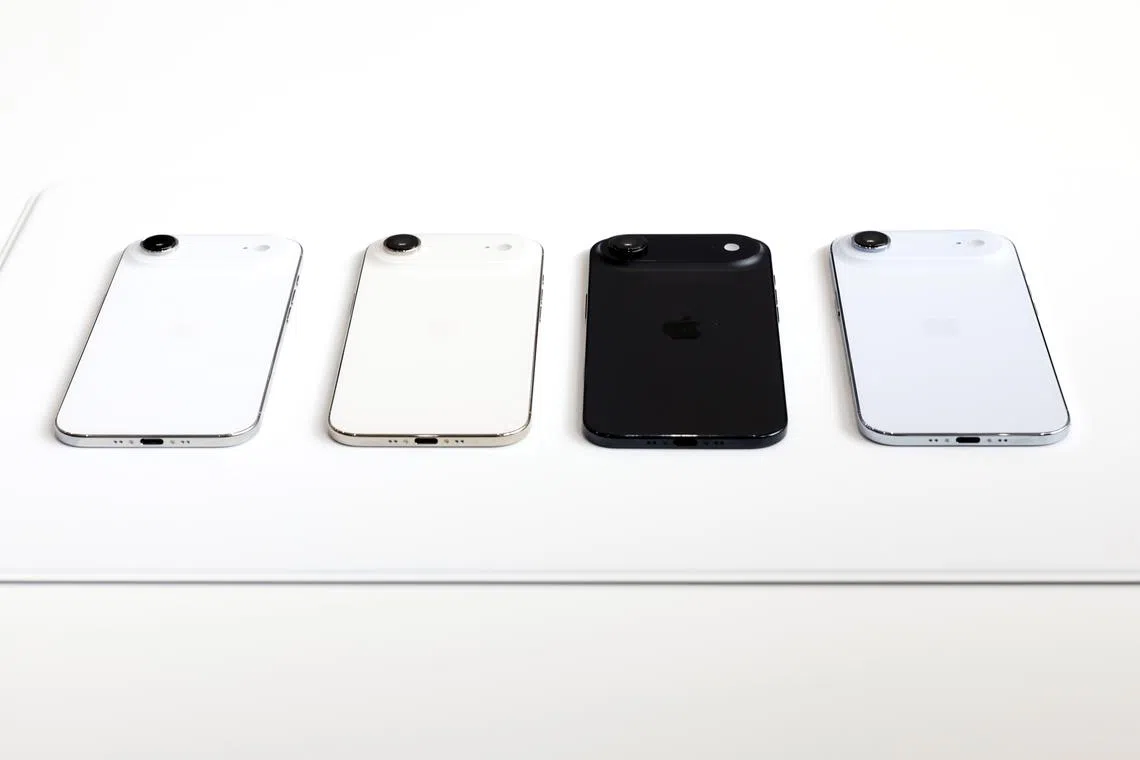Slim iPhone Air could be a design win for Apple, analysts say
Sign up now: Get ST's newsletters delivered to your inbox

Analysts said the iPhone Air could help Apple win back customers in China, where Apple has lost market share to rivals who have introduced slimmer smartphones.
PHOTO: REUTERS
CUPERTINO, California – Apple chief executive officer Tim Cook appeared to be channelling his predecessor and design genius Steve Jobs on Sept 9 when he unveiled the iPhone Air, the company’s slimmest handset yet and the biggest change in eight years to a line-up that fans and analysts complained was stagnating.
Mr Cook kicked off the company’s annual product launch event at its Cupertino, California, headquarters
Inside its 5.6mm-thick frame – thinner than Samsung Electronics’ S25 Edge at 5.8mm – the iPhone Air’s circuitry has been shrunk to the size of a few postage stamps, clearing the way for as much battery capacity as possible.
Many analysts had predicted a ho-hum reception to the product launches, but on Sept 9 some said the four new iPhones – iPhone Air, iPhone 17, iPhone 17 Pro and iPhone 17 Pro Max – offered a line-up likely to appeal to customers with varied budgets.
And doubts still linger about whether the new smartphone will match its promised battery capacity and whether consumers will settle for one less camera.
It will have Apple’s best and newest A19 Pro processor chip, which is tuned to handle artificial intelligence tasks, and two new custom Apple communications chips.
“I heard loud claps the moment it was announced,” said Mr Gaurav Chaudhary, a YouTuber with nearly 24 million followers, popularly known as “Technical Guruji”.
He praised the Air’s titanium frame and “ceramic shield” glass, which Apple said make the device more durable.
Mr Chaudhary said that despite hearing numerous leaks about the device ahead of time, he was still impressed after handling it in the Steve Jobs Theatre at Apple headquarters.
However, he said he still wants to see if Apple’s battery life claims hold up.
Seventeen years ago, Mr Jobs introduced the company’s first MacBook Air by pulling the ultra-thin laptop from an interoffice envelope, to highlight how portable it was.
The iPhone Air, which borrows its name and design language from the laptop, may be what Apple fans have wanted for years: a device that is distinct from competitors and packed with feats of hardware engineering.
“I think in an era where we’ve seen a large degree of sameness, it’s great to see Apple bring a new product to the market,” said PP Foresight analyst Paolo Pescatore. “It kind of reinvigorates the whole segment of iPhone.”
On the downside, however, the iPhone Air has only one camera, compared with two separate cameras on the base iPhone 17 and three on the Pro models.
It will be critical to confirm whether it can live up to Apple’s battery life claims, said Mr Ben Bajarin, chief executive officer of technology consultancy Creative Strategies.
Apple’s custom chips should help, he added, because the company has spent more than a decade designing its own chips with a relentless focus on energy efficiency and size.
However, the launches brought no new announcements on artificial intelligence (AI) features to help Apple close the gap with products such as those of Alphabet’s Google, which showcases the capabilities of its Gemini AI technology in its flagship phones.
But analysts said the iPhone Air was likely to spur many upgrades, boosting Apple’s sales in the crucial holiday shopping season.
It could also help Apple win back customers in China, where it has lost market share to the slimmer and cheaper smartphones of rivals, said analysts, though some of them cautioned about sales prospects there for the new iPhone Air.

The iPhone Air will have Apple’s best and newest A19 Pro processor chip, which is tuned to handle artificial intelligence tasks.
PHOTO: EPA
“We don’t expect the iPhone Air to deliver a major sales boost, as Apple compromised on battery life, cameras and audio to achieve the slimmer design – features crucial to consumers,” said Mr Will Wong, senior smartphone analyst at research firm IDC.
The iPhone Air is priced in the middle of the iPhone line-up and at US$100 (S$128) less than the debut price of Samsung’s Galaxy S25 Edge, which hit markets earlier in 2025 and shipped one million units in the second quarter, according to IDC.
In Singapore, the iPhone Air is priced from $1,599.
The price should make it a strong seller, said Ms Nabila Popal, senior research director with IDC’s Worldwide Quarterly Mobile Phone Tracker unit.
Ms Popal predicted better sales for the iPhone Air “not only because it’s priced better but because the (iPhone) Plus – which essentially the Air is replacing – already did between 5 and 7 per cent of Apple’s shipments”.
“Apple’s late, but when they do it, they do it bigger or louder or better than anyone,” she said. REUTERS


